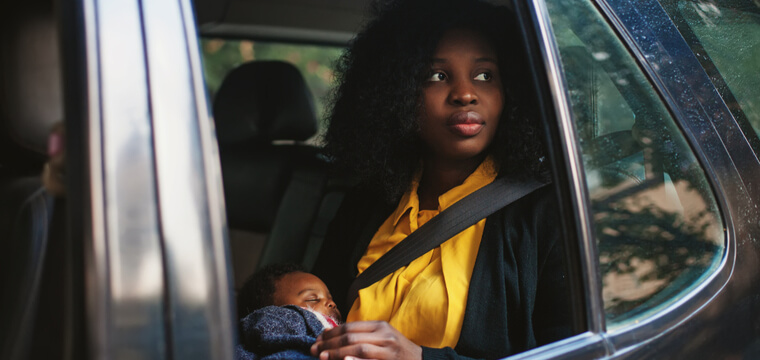If you plan to drive to a holiday destination, you’re probably aware of how dangerous it can be to get stranded on the side of a road in the middle of nowhere. By making the right preparations, you can keep yourself out of this pickle.
10 January 2021 · Isabelle Coetzee

If you’re planning a road trip, you probably know how dangerous it can be to get stranded on the side of a road in the middle of nowhere.
By making the right preparations, you can keep yourself out of this pickle. We look at your insurance options, what you should do before you hit the road, and what to keep in mind while you’re driving.
Tip: Make sure your vehicle is covered before you leave your driveway – click here for car insurance.
The difference between insurance and roadside assistance
Although both will assist you when you’re having trouble with your vehicle, car insurance and roadside assistance are not interchangeable, and you need to consider both before you drive off.
Sumarie Greybe, co-founder at AI-driven insurance provider, Naked, points out that there are two main kinds of car insurance that you should be aware of:
“Deciding which car insurance policy is right for you is all about looking at your budget, your lifestyle, the amount of cash you have access to, the value of your car, and your tolerance for risk,” says Greybe.
READ MORE: These factors will fluctuate your car insurance excess
Greybe explains that roadside emergency assistance is designed to help you when you are faced with unexpected incidents, to get you out of physical danger or inconvenience. However, she emphasises that it’s not an insurance policy.
“Most car insurance providers include an option for roadside assistance within your car insurance policy, or they include it automatically. The more progressive insurance providers offer 24/7 roadside assistance and also enable you to seek emergency assistance from their mobile app,” says Greybe.
“Examples of unexpected incidents and roadside emergencies include a flat battery, flat tyres, your keys being locked in your vehicle, fuel assistance, minor roadside repairs, tow-in service to the nearest approved dealership, engine trouble, and more. If required, it can also include assistance with hotel accommodation and car rental,” she explains.
What to do before you leave
Greybe points out that it’s important to be prepared prior to hitting the road. She suggests you do the following to make sure your insurance provider will have you covered on your adventures:
1. Make sure the car is roadworthy
To improve road safety and ensure a hassle-free claims experience if something bad happens on the road, make sure that your car is roadworthy. For example:
2. Make sure the paperwork is up to date
Your vehicle licence disc needs to be renewed once a year. Ensure all drivers for your car have up-to-date driving licences. This licence needs to be renewed every five years, and it includes an eye test.
3. Get the right insurance cover for trips outside South Africa
If you’re planning to visit neighbouring countries or to go even further north, find out whether your policy covers you outside South Africa’s borders. Be sure to get a letter from your insurer that you can present at the border.
Most South African policies will only cover you for damage to your own car while you are outside of our borders. You must take out separate third-party liability insurance cover when you travel outside South Africa.
4. Update the policy to cover the extras
If you have added expensive accessories and extras to your car, such as a roof-rack, bull bar, xenon lights, or extra sound equipment, update your policy to ensure they are covered.
What you should keep in mind on the road
Once you’ve made sure that your vehicle is ready for the road and your insurance and licences are in place to protect you, Greybe suggests keeping the following in mind while you’re on the road.
One of the most important points to remember is to remain vigilant. Greybe says that with the economy slowly opening up and criminal activity inevitably increasing, this is all the more important.
“A South African car owner’s probability of falling victim to car theft or hijacking is about 1 in 121, or 0.826%, according to the 2019/2020 crime statistics from the South African Police Service,” says Greybe.
With this in mind, she points out the following safety tips for drivers on South Africa’s roads:
To add to this, Wynand van Vuuren, partner of client experience at insurer King Price, recommends avoiding roadside accident statistics by keeping the following in mind:
“And finally, chill. Everyone else on the roads is trying to get to their loved ones as well. By doing everything you can to stay safe, you’ll make your holiday trips fun and enjoyable, not the survival of the fittest,” says Van Vuuren.
Get a car insurance quote today to find out whether you could save on your premium each month.
Free tool

info@justmoney.co.za
4th Floor, Mutual Park, Jan Smuts Drive,
Pinelands, Cape Town, 7405
© Copyright 2009 - 2025 · Powered by NCRCB29
Terms & Conditions
·
Privacy Policy
·
PAIA Manual
View your total debt balance and accounts, get a free debt assessment, apply for a personal loan, and receive unlimited access to a coach – all for FREE with JustMoney.